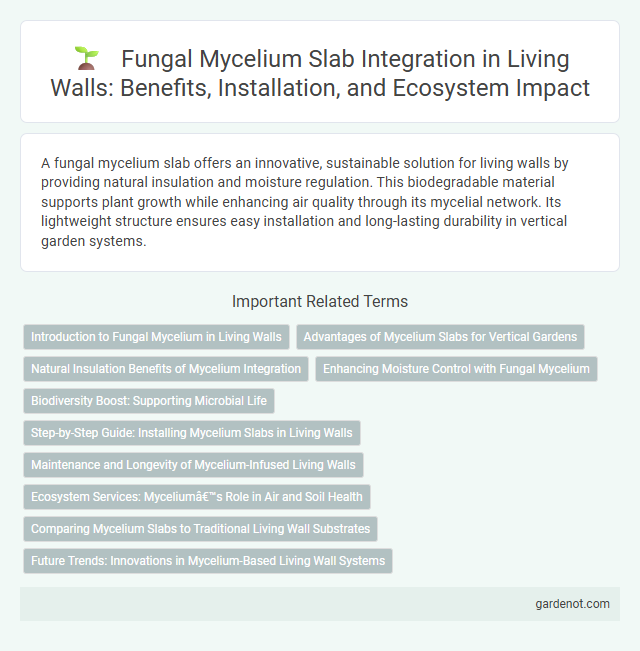A fungal mycelium slab offers an innovative, sustainable solution for living walls by providing natural insulation and moisture regulation. This biodegradable material supports plant growth while enhancing air quality through its mycelial network. Its lightweight structure ensures easy installation and long-lasting durability in vertical garden systems.
Introduction to Fungal Mycelium in Living Walls
Fungal mycelium in living walls serves as a biodegradable and sustainable growth medium that promotes plant health and structural stability. Its natural ability to bind organic materials creates a porous yet durable substrate that enhances water retention and nutrient exchange. Integrating fungal mycelium supports overall ecosystem balance by fostering beneficial microbial activity within vertical garden systems.
Advantages of Mycelium Slabs for Vertical Gardens
Mycelium slabs offer superior insulation and natural moisture regulation, enhancing the microclimate of vertical gardens. Their biodegradable and lightweight structure provides sustainable support for plant roots, reducing the environmental impact compared to traditional growing mediums. The mycelium's ability to suppress harmful pathogens promotes healthier plant growth and increases the longevity of living walls.
Natural Insulation Benefits of Mycelium Integration
Fungal mycelium slabs provide exceptional natural insulation due to their dense, fibrous structure that effectively traps air, reducing heat transfer in living walls. Integrating mycelium enhances thermal regulation by maintaining consistent indoor temperatures while also offering biodegradability and resistance to mold and pests. This sustainable insulation solution not only improves energy efficiency but also supports healthier indoor environments by minimizing reliance on synthetic materials.
Enhancing Moisture Control with Fungal Mycelium
Fungal mycelium slabs improve moisture control in living walls by naturally regulating humidity levels through their porous structure. These slabs absorb excess moisture, preventing waterlogging while releasing trapped water during dry periods, enhancing plant health. Their sustainable composition also reduces the risk of mold growth, promoting a balanced microenvironment within vertical garden systems.
Biodiversity Boost: Supporting Microbial Life
Fungal mycelium slabs significantly boost biodiversity by creating a thriving habitat for diverse microbial communities within living walls. These slabs facilitate symbiotic relationships between fungi and beneficial bacteria, enhancing nutrient cycling and plant health. Integrating fungal mycelium into green walls supports ecosystem resilience by promoting microbial life essential for sustainable urban environments.
Step-by-Step Guide: Installing Mycelium Slabs in Living Walls
Begin by selecting a suitable substrate such as wood or foam panels that provide adequate support and moisture retention for the fungal mycelium slabs. Secure the slabs onto the living wall framework using non-toxic adhesives or mechanical fasteners, ensuring even spacing for optimal mycelium growth and air circulation. Maintain consistent humidity and temperature levels while regularly monitoring the slabs for signs of contamination or dehydration to promote healthy mycelium colonization and integration with surrounding plants.
Maintenance and Longevity of Mycelium-Infused Living Walls
Fungal mycelium slabs in living walls offer low-maintenance benefits due to their natural resistance to pests and mold, reducing the need for chemical treatments. Regular moisture monitoring and controlled humidity levels are crucial to sustain mycelium vitality and structural integrity over time. Proper care extends the longevity of mycelium-infused living walls, ensuring continued air purification and aesthetic appeal.
Ecosystem Services: Mycelium’s Role in Air and Soil Health
Fungal mycelium slabs contribute significantly to ecosystem services by enhancing air quality through the filtration of airborne pollutants and the sequestration of carbon. Their hyphal networks improve soil structure and nutrient cycling, promoting healthy microbial diversity and increasing soil aeration and moisture retention. These properties make mycelium an essential component in living walls for maintaining both air and soil health in urban environments.
Comparing Mycelium Slabs to Traditional Living Wall Substrates
Mycelium slabs offer a sustainable and biodegradable alternative to traditional living wall substrates like soil or synthetic foams, providing superior aeration and moisture retention for plant roots. Unlike conventional substrates, mycelium promotes beneficial microbial activity, enhancing nutrient cycling and plant health in vertical garden systems. The lightweight and insulating properties of mycelium slabs reduce structural load and improve energy efficiency in living wall installations.
Future Trends: Innovations in Mycelium-Based Living Wall Systems
Fungal mycelium slabs are revolutionizing living wall systems by offering biodegradable, lightweight, and highly porous structures that enhance plant root aeration and moisture retention. Future trends emphasize integrating mycelium with sensor technology for real-time environmental monitoring and adaptive growth regulation in urban green spaces. Innovations include hybrid composite materials combining mycelium with recycled substrates to improve durability and thermal insulation in sustainable architecture.
Fungal mycelium slab Infographic

 gardenot.com
gardenot.com